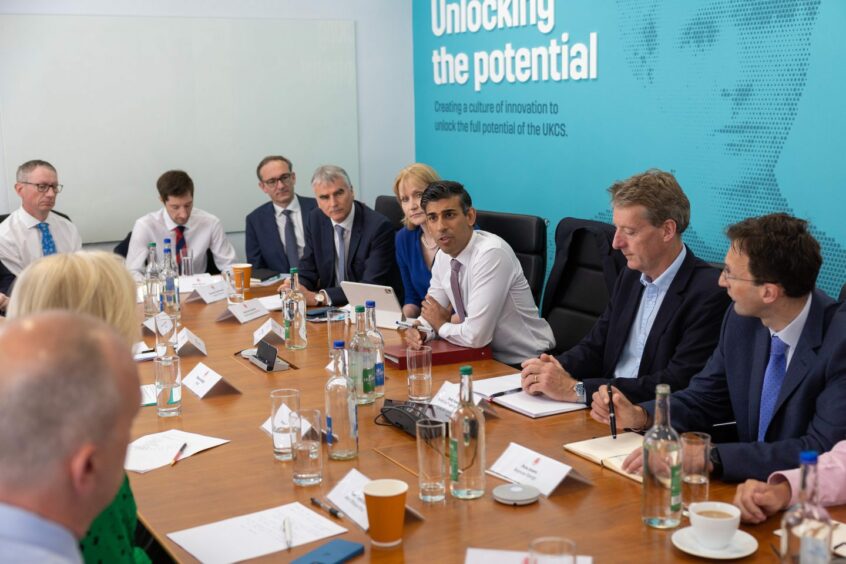
Oil industry leaders have said the “ball is in the Chancellor’s court” to now address their concerns ahead of key windfall tax legislation being published next month.
Industry bosses met with Rishi Sunak for a high-level meeting in Aberdeen today, delivering “in blunt terms” the impact of levy on their businesses.
“Chastened is the word I would use”, one person said of the Chancellor’s reception during the meeting, but another insisted that the overall tone was “constructive”.
Last month Rishi Sunak said the levy would end when oil prices return to “historically more normal levels” – prompting industry questions on what exactly that means.
We spoke to the Chancellor following the meeting today, and asked him the same.
Rishi Sunak told us: “It is hard to put a specific figure on it because there is a difference between oil and gas and we need to find what is sustainable.
“What I have said to people is last time this happened the trigger price was set at $75 but that is just for oil, not gas. Long term averages of oil prices are around $60-$70.
“Actually as I spoke to companies this morning on this question, I was asking them what long term oil price do they plan their businesses at and talk to their shareholders about, and again, those numbers are typically in that range.”
Following the meeting, one industry insider said there remains “a lack of understanding written in black and white” on the price to end the levy and how quickly that would be brought about.
But it’s understood the Chancellor restated to execs that the levy will end in 2025 as previously mooted under the “sunset clause”.
On his discussions with the industry today, Mr Sunak added: “I wanted them to know how important it is for the UK economy, not just for the jobs it supports but also energy security it provides us.
“And looking to the future, how it will help us transition to net zero. It a great opportunity to acknowledge that and talk to people about it and what we are doing to support the industry.
“But also, talk to them about what we are doing to support them and families around the country with the cost of living.
“I know things are difficult right now. People are seeing prices rise and are anxious. Recently we announced significant amounts of support to help families with the cost of living. That support is for everybody worth up to £1,200 for the most vulnerable. I wanted to talk about that and explain how it’s going to help.”
‘Chastened’
Rishi Sunak had a 40-minute private roundtable with top executives in Aberdeen, followed by a broader Q&A session at the Net Zero Technology Centre.
Bosses from firms including BP, Shell, TotalEnergies, Harbour Energy and Neptune Energy were in attendance, along with Offshore Energies UK (OEUK) and the North Sea Transition Authority (NSTA).
Under the windfall tax, investment incentives of 91 pence per pound spent are available on new projects – but projects which are already recently brought online cannot access these and therefore now face problems with their economics.
The incentives also do not currently apply to investments in key low-carbon tech like carbon capture and storage (CCS), hydrogen and platform electrification.
One source said Rishi Sunak did recognise the industry’s need for investment incentives to apply to low-carbon areas, but no promises were made about whether it would indeed be included in the legislation.
Another sticking point is on decommissioning rebates; the EPL does not allow firms to carry forward the heavy losses made during decommissioning on future profits, as is normally the case.
It’s understood the Chancellor was clear that point wouldn’t change in the legislation.
“The ball is very much in the Chancellor’s court now”, one source said.
“We’ve made our concerns clear and there’s a closing window of opportunity between now and the legislation being published in July to address them.”
Dented confidence
Trade body OEUK said the Aberdeen meeting with Rishi Sunak was a “candid and constructive conversation” and bosses warned that the levy risks undermining investment.
Both sides have committed to further discussions.
CEO Deirdre Michie said: “The Energy Profits Levy is an unexpected new tax that changes the basis for investments. We had a candid and constructive meeting with the chancellor to discuss these issues and our industry leaders were clear about their concerns, especially the impact on investor confidence. Both sides have committed to further discussions.
“We will work constructively with the UK government and do our best to mitigate the damage this tax will cause but if energy companies reduce investment in UK waters, then they will produce less oil and gas. That means they will eventually be paying less taxes and have less money to invest in low carbon energy.”
Andy Samuel, CEO of the industry regulator, NSTA, added: “We very much appreciated the constructive meeting – the tripartite between government, industry and the NSTA remains crucial for energy security and achieving net zero.
“We welcome the consultation on the draft bill – it is crucial to get it right and more broadly to restore investor confidence and support important projects including clean power for offshore installations.”
Recommended for you

 © Supplied by HM Treasury
© Supplied by HM Treasury © Supplied by HM Treasury
© Supplied by HM Treasury